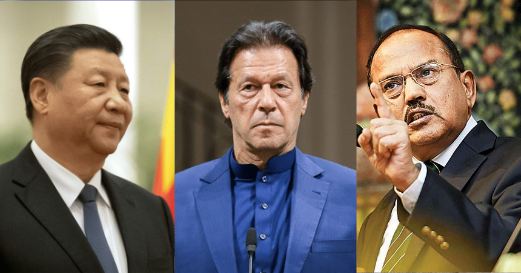On Thursday, the Director Generals of Military Operations (DGMOs) of India and Pakistan released a joint statement, reiterating their commitment to peace along the Line of Control (LoC) and a ceasefire effective last midnight. The Army said the two officers had been in touch over the telephone hotline with both sides having reiterated that the existing mechanisms of hotline contact and border flag meetings will be utilised to resolve any unforeseen situation or misunderstanding.
“Both sides agreed for strict observance of all agreements, understandings and cease firing along the Line of Control and all other sectors with effect from midnight 24/25 Feb 2021,” the joint statement said.
The sudden thaw in relations between the two nuclear-armed enemy nations has taken many by surprise. However, there is much more to all that has unravelled in the last 24 hours than meets the eye. In the centre of the same is Pakistan’s desperation to get out of the isolated void which it has been put into by an unprecedented diplomatic offensive by India since 2019. With everything going wrong for Pakistan, the terror state realised that reducing hostilities with India is the only way which can decrease its woes to an extent.
According to a report by Hindustan Times, the joint statement by DGMOs of the two countries is one of the many ‘positive’ developments which can be expected in the times to come. Such a reiteration to peace along the LoC and an end to ceasefire violations has come in the backdrop of Indian National Security Adviser Ajit Doval, and his counterpart in Islamabad – Moeed W Yusuf engaging in months of backchannel talks with each other.
The joint statement is the first outcome of these conversations that included at least one face-to-face meeting in a third country, a high-level source told HT. He added that only a small group of top government leaders including Union Home Minister Amit Shah, Defence Minister Rajnath Singh and External Affairs Minister S Jaishankar were aware of the details of the talks.
It is no secret that Pakistan suffers from a palpable fear of Ajit Doval, particularly after he publicly stated that the terror state will cease to exist in its current form if it tries another Mumbai-styled terror attack, following which Islamabad has been blaming the man for all that goes south in the country. As such, when Doval himself has been reportedly engaging in backchannel talks with Pakistan, the Islamist nation had no option but to fall in line – on paper at least.
In any case, on Thursday, Pakistan was retained in the FATF’s grey list, where it was put in the first place due to major lobbying by India. Therefore, at a time when Islamabad wants an exit from the shameful listing, reducing hostilities with India is the only first and natural step to take. And then, there is the China angle to the entire thaw between India and Pakistan.
Only recently, India and China completed the disengagement process at Pangong Tso lake – the most sensitive and crucial area when it comes to the ongoing military standoff between the two countries. Since May 2020, China has been made to live through hell. It has been a first-hand witness of India’s unflinching stand and resolve of defending its territorial integrity, come what may. As such, it is very likely that diktats were issued by Beijing to Islamabad – to reduce tensions with India, as that helps the paper dragon secure a stalled CPEC project in Pakistan, running illegally via Gilgit Baltistan no less.
CPEC has already run into major roadblocks in Pakistan, as Chinese-sponsored projects are increasingly being made targets by Baloch and Sindhi fighters, who are dead opposed to the idea of having the CCP run-over their land already illegally occupied by Pakistan. Having to deal with a headache in Pakistan, China would not want to lose its own control of Aksai Chin – which too is sovereign Indian territory under the occupation of the Chinese.
While peace in South Asia means that Aksai Chin remains under Chinese control, a flare-up in tensions between arch-rivals India and Pakistan could spell the death knell of Chinese occupation of Aksai Chin, as the Modi government’s mandate of taking back control of Gilgit Baltistan, PoK and Aksai Chin is more than clear. For this very reason, China has itself blinked in the standoff, and is now disengaging along the LAC, while also telling Pakistan to behave itself along the LoC.
